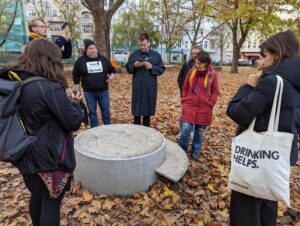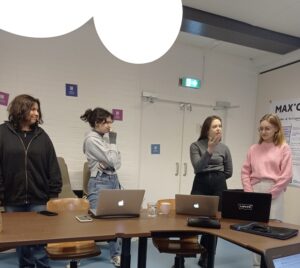Hoodmaps
INFORMATION GATHERING & VISUALIZATION
Hoodmaps is a crowdsourced map to navigate cities based on tags such as: hipsters, tourists, rich, normies, suits and uni areas.
Short summary of the practice
Hoodmaps is a crowdsourced map to navigate cities based on tags as: hipsters, tourists, rich, normies, suits and uni areas. The platform is solely based on user input, and users can vote for or against tags submitted by others—the bigger the tag is, the more validation it has from users. If an area is overlapped by two or more colours, the most popular category will prevail. The website features a thousand of the largest cities from around the world and is constantly being edited with new user content that flags Google Maps with information about touristed zones of cities among other information.
Goal of the practice
HOODMAPS is open for anyone, who would like to add their perception of a place. The tool is easy to use and addressed especially inhabitants, who want to share insights and for visitors, who can explore a place through the eyes of the locals.
Target group
Anyone can use the tool to add their perception of a place.
Number of participants: Unlimited
Age of participants: Youth and Adults, 12+
Materials
- Phone
- Internet access
Method settings
Can be used in any city.
Duration
A few minutes, the time required by participants to add their tags on the app.
Preparation
1-2 hours
Step by step guide
- Hoodmaps work with the perceptions and ideas of individuals, asking users to designate which parts are dominated by “tourists,” the “rich,” “hipsters,” “suits” (business people), “uni” (for university students), and “normies” (for, well, everyone else.) Each category is designated a color, creating a heat-map of sorts.
- Anyone can add new tags, describing a place where they live or visited, up- or downvote tags or color areas.
- The perceptions are entered through the website, where one can as well explore other entries and perceptions.
Expected output
The expected output of Hoodmaps is the creation of user-generated maps that reflect the perceptions and categories of different areas within cities. Ideally, the results should be diverse, representative, and reflective of the various perspectives and experiences of the users. The maps should provide valuable insights into how different groups perceive and interact with specific neighbourhoods or zones.
DOs, DONTs and ethical considerations of the method
It’s important to emphasize that the use of Hoodmaps should be embedded within an educational context. Without proper guidance and facilitation, the platform runs the risk of perpetuating negative biases and stereotypes towards the neighborhood and its inhabitants. Therefore, the tool should be utilized in a responsible manner that promotes critical thinking, empathy, and a holistic understanding of the complexities involved in community perceptions.
Change the method brings to the communities
Hoodmaps primarily serves as a tool for collecting perceptions of others about a specific place. It’s important to note that these perceptions can often be expressed in a stereotypical and biased manner, as the platform allows anonymous commenting. As it is, the map itself may not have a direct impact, other than being an indication of deficiencies or problems within a neighbourhood.
Adaptation/Application of the method
For educators hoodmaps is interesting to discuss perceptions on a place, challenging the ideas of their learners. Hoompas stimulate debates, help to understand needs of communities and in general provide as well researcher data on subjective matters, as a collective mindmap.
Credit, References, and Resources
Link to the tool – https://hoodmaps.com/berlin-neighborhood-map
Hoodmaps alternatives – https://www.producthunt.com/products/hoodmaps/alternatives
Building a startup in public: from first line of code to frontpage of Reddit – https://levels.io/hoodmaps/
This Map Wants You to Stereotype Your City, the Article in Bloomberg – https://www.bloomberg.com/news/articles/2017-08-30/hoodmaps-wants-you-to-stereotype-your-neighborhood
Related posts

Active Citizenship
Active citizenship in this context refers to the power of individuals or small resident groups to proactively engage in community mapping exercises for improving their city or neighborhood.

ArcGIS Online
ArcGIS Online provides a cloud-based mapping and analysis solution. It is used to create interactive web maps, analyse data, share and collaborate.

Civic Alert
Civic Alert is a platform designed to facilitate communication between citizens and governments. Citizens can use their mobile application to report problems in the city to the authorities in three easy steps.
